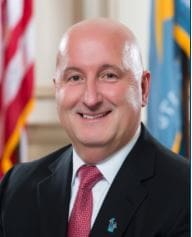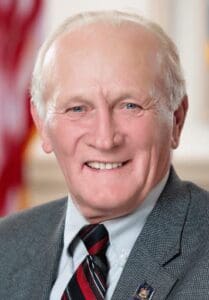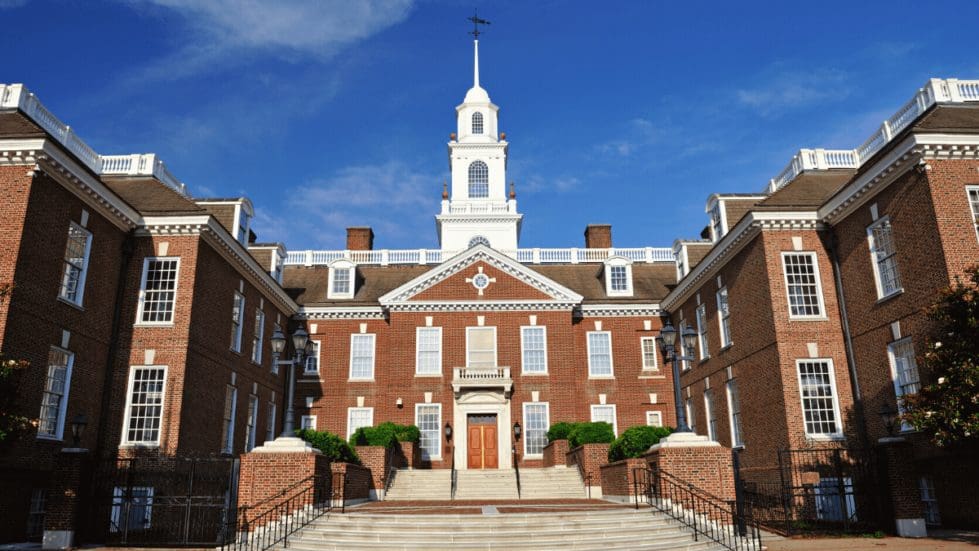

A mini-bond bill that changed the way bidders must hire workers got a healthy debate in the Senate Tuesday.
A typically commonplace measure that would have added 17 projects to this year’s Bond and Capital Improvements funding got mired in controversy Tuesday over wording that required union and minority participation in four bids.
That requirement in a four-project pilot program would mean that some minorities, including Hispanics, would be left out, Senate Republicans maintained.


Jack Walsh
Rep. Jack Walsh, D-Newport/Stanton, sponsor of Senate Bill 35, and others argued that it actually made sure they could participate and that the measure would increase minority opportunity to earn state bids.
Ultimately, the measure passed 15-6 along party lines in the Senate Chamber today.
The change in labor requirements was detailed in epilogue language and included mandatory hiring of union and minorities, along with state residency goals suggested by the Office of Management and Budget for four Department of Transportation projects.
The pilot projects have no place in SB 35, the Republicans said.
They worry any findings could ultimately end up altering Delaware’s approach to the areas of Community Workforce Agreements and Disadvantaged Business Enterprise.
Any pilot project sets a precedent that almost always is adopted, Republicans said.
Mini-Bond changes
Walsh and Cerron Cade, director of the Office of Management and Budget and former secretary of labor, said the pilot projects will ensure a bigger minority stake in state-funded construction contracts.
One minority engineering and construction owner, Javier G. Torrijos, testified that for members of the Latino community, the pilot projects add up to nothing more than a “union mandate.”


David L. Wilson
“If anything this will lift up the Latino community,” Cade said. “It doesn’t mandate any union requirement.”
Rep. Dave Wilson, R-Seaford, questioned the lack of public input and discussion.
“I’ve served on the Bond Bill committee, never seeing anything like this,” said Wilson. “I’m getting all kinds of phone calls.”
Cade said some of the projects are slated to begin this spring.
“Labor is going to have to make a commitment,” he said. “They will have to hit specific minority hiring goals and state residency goals.”
Cade defended the pilot projects inclusion in what’s normally just a list of additional projects.
“We aren’t just doing a pilot for the sake of doing a pilot,” he testified.
He pointed to reported workforce disparity among minorities with data collected from 2015-2020 as justification for the pilot projects.
The data revealed that Latino firms had secured only 3% of state projects across those eight years.
ALSO FROM LEGHALL: He’s back. Osienski refiles bills to legalize marijuana and create weed industry
“We don’t see them on state projects,” Cade said. “While these firms are plentiful, they aren’t necessarily getting state contracts.”
“We’re not against diversity,” said Torrijos, owner of TORREngineering LLC. “We want more of the pie. The process was wrong.”
Torrijos said he’d looked at the impacts long-term.
“I’m standing here representing every Latino owner who doesn’t have unions or union workers,” he said. “You want to have a diverse workforce then take the language out. What we’re asking is to take the language out.”


Brian Pettyjohn
Sen. Brian Pettyjohn, R-Georgetown, said that the pilot project focus on union and minority workers seems to indicate that the construction industry is all white. It’s not in Sussex County, he said.
“I’m looking up here at the men and women in the gallery,” said PettyJohn. “It’s not just all white men there. We have a diverse pool of workers who do great work in Sussex County. I see the people who work in Sussex County. And I’ll tell you what, they’re skilled. Saying you’re seeing unskilled labor, this is very skilled labor.”
Wilson said the bill was supposed to help minorities.
“This bill is causing a problem for minorities,” Wilson said.
He introduced an amendment to remove the requirement for union and minority labor from the mini-Bond bill. Cade said it would undermine the projects.
“Not only do we want to look at making sure that we’re encouraging doing business with diverse businesses but we also want to be sure that we’re guaranteeing diverse hiring,” he said.
“One doesn’t necessarily mean the other,” he said. “So if you take this out (labor) then the only thing that will be diverse are the companies that are on those sites and that doesn’t necessarily impact the workforce on those sites.”
Wilson’s amendment failed along party lines.
Walsh introduced an amendment that would remove wording that said workers had to be legal citizens of the state. He said he was doing it because of Hispanic community concerns that would the wording would mean immigrants couldn’t be hired.
Pettyjohn said the removal could have unintended consequences by allowing workers from nearby states to be hired, rather than Delaware workers, which was the intent of the funding.
The amendment passed along party lines.
The bill now moves to the House for consideration.
Share this Post


